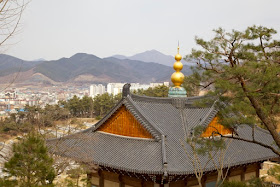Our group rented a Korean charter bus to take us all to and from the plant. Charter buses here generally have a more decorative interior than American ones but this one was decked out to the max. There fringed purple curtains that matched the purple seats, colored lights on the ceiling, a hot/cold water dispenser with coffee mixes, and a large flat-screen TV with a DVD player. The driver was nice enough to play a movie for us - it was an odd Korean cartoon but it helped pass the time :)
Upon arriving at the plant, we met our tour guide who spoke to us briefly before showing us two short movies. One movie was about the plant and what we would be seeing on the tour, and the other was about how wonderful Hyundai is as a car company. Our tour guide then told us the two rules we must obey during the tour: 1.) no photos can be taken in the plant 2.) hold your child's hands tightly
Walking through the plant was incredible. We walked through multiple huge and noisy buildings, each with a different purpose. The first building we walked through was where sheets of metal were cut and pressed into doors, sides, trunks, and hoods. There were only 40 people working in the large building, simply to maintain the robots and machines that were doing all of the labor. I've seen pictures and videos of big robotic arms before but seeing them in person was extraordinary. They moved so gracefully and precisely; effortlessly lifting large pieces of metal as if they were paper.
The welding building was the reason for tour rule #2. We passed at least 20 large red "emergency stop" buttons that were exactly at the eye level of most of the children with us. The buttons were there, unobstructed, begging for a child's hand to touch them. To add to the comedy of the situation, there was electronic merry-go-round music resonating throughout the building. Were they tempting us? I admit, I wanted to push a button myself :)
I actually found a website with a video someone took of parts of the tour of this plant. I suppose they can argue that that rule #1 technically says no photos. You can view the video at www.drivingthenation.com/?p=568
As a parting gift, we were given a model car and an informational book that says Hyundai is "loved by the world," will "make your dreams come true," and will "bring you happiness." I'm not quite sure about all of that but getting the toy car did make me smile :)
*******
"If you never did, you should. These things are fun, and fun is good."
"If you never did, you should. These things are fun, and fun is good."
~Dr. Seuss






















































